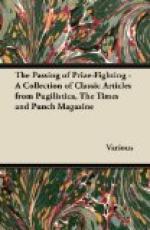We slept. The seasons went their
round. We did not hear the rover
Winds in our coverlets of
grass, the plough-shares tear the mould;
We did not feel the bridal earth thrill
to her April lover
Nor hear the song of bees among the poppies
and the clover;
Snow-fall or sun to us were
one and time went by untold.
We woke. The soil about us shook
to the long boom of thunder—
War loose and making music
on his crashing brazen gongs—
The sharp hoof-beat, the thresh of feet
stirred our old bones down under;
Wheels upon wheels ground overhead; then
with a glow of wonder
We heard the chant of Englishmen
singing their marching songs.
Blood of our blood! We heard them
swing a-down the teeming highways,
As we swung once. We
heard them shout; we heard the jests they cast.
And we dead men remembered then blue Junes
in Devon by-ways,
Star-dusted skies and women’s eyes,
women with sweet and shy ways.
These were their race!
We strove to rise, but the strong clay held us fast.
Year in, year out, along the roads the
ceaseless wagons clattered;
Listened we for an English
voice ever, ever in vain;
Far in the west, year out, year in, terrible
thunders battered,
Drumming the doom of whom—of
whom? Hope in our hearts lay shattered....
Then we heard the lilt of
Highland pipes and English songs again.
On, ever on, we heard them press; their
jaunty bugles blended
Proudly and clear that we
might hear, we dead men of old wars,
How the red agony was passed and the long
vigil ended.
Now may we sleep in peace again lapped
in a vision splendid
Of England’s banners
marching onwards, upwards to the stars.
PATLANDER.
* * * * *
[Illustration: THE MILITARY MUZZLE.
FRITZ. “AFTER ALL, IT’S NOT MUCH
GOOD BARKING WHEN THEY’VE STOPPED MY
BITE.”]
* * * * *
[Illustration: OUR SENSITIVE YOUTH.
Cadet. “’SCUSE ME, SIR—ARE YOU A DOCTOR? THERE’S A BOY FAINTED.”
Doctor. “AH—FATIGUE, I SUPPOSE?”
Cadet. “No, SIR. THE SERGEANT SPLIT AN INFINITIVE.”]
* * * * *
BRAINS AND BALDNESS.
BY OUR MEDICAL EXPERT.
(With acknowledgments to “The Times").
Baldness among men is undoubtedly on the increase, and various reasons have been assigned for its appearance in an exacerbated form. In particular the stress and strain of the War have been mooted, and the argument is reinforced by such words as Chauvinism, which, Mr. LLOYD GEORGE is probably not aware, is derived from chauve. War is a solvent of equanimity; in the cant but expressive phrase it becomes harder to keep one’s hair on. Again, inter arma silent Musae. Fewer people have been playing the pianoforte, an exercise which has always exerted a stimulating effect on the follicles. Our political correspondent at Paris writes that M. PADEREWSKI’S once luxuriant chevelure has suffered sadly since he has taken to politics, but that after playing for a couple of hours to Mr. BALFOUR a distinct improvement was noticeable.




